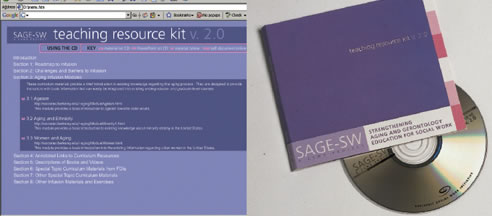Strategy 2
Infuse Gerontological Content
Most social workers, regardless of specialty, work with older adults at some point in their career. However, many social workers who specialize in the care of older adults begin this focus after graduation, often without formal training in geriatrics. “We know from 30 years of data that just offering a specialization in aging or elective courses in aging does not attract enough students to meet workforce demands,” says Nancy R. Hooyman, PhD, who serves as Co-Director for the CSWE National Center for Gerontological Social Work Education. “Offering separate courses in gerontology will not prepare an adequate number of students.” A more comprehensive approach to preparing social workers to meet the demands of the growing aging population is required.
The first curriculum program funded by the Hartford Foundation was the Council on Social Work Education Strengthening Aging in Social Work Education (SAGE-SW). This was followed by the Geriatric Enrichment in Social Work Education (GeroRich) Project (from 2001 to 2004), which aimed to make curricular and programmatic revisions to infuse geriatric competencies in required curricula. The currently funded program (2004 to 2012) is the CSWE National Center for Gerontological Social Work Education (Gero-Ed Center). Since 1998 grants to these programs have totaled $14.1 million.
 (Above) Teaching resource kit from the Strengthening Aging and Gerontology Education for Social Work (SAGE-SW) program.
(Above) Teaching resource kit from the Strengthening Aging and Gerontology Education for Social Work (SAGE-SW) program.
The GeroRich and Gero-Ed Center programs adopted an infusion approach to curriculum development, which means that geriatric competencies and content are embedded in generalist curriculum that all students must take. The term competency in the context of social work education means that an individual can demonstrate that he or she has integrated certain knowledge, values, and skills into professional social work practice.
To implement sustainable changes in social work programs and core curricula, Dr. Hooyman and her colleagues realized that change must be made at the institutional level. The typical approach to curriculum development involves training individual faculty. But it can be very difficult for a single faculty member to make institution-wide transformation. In addition, instructors for courses can change. “We wanted to be sure that changes would endure,” says Dr. Hooyman. Therefore, the Gero-Ed Center mostly funds social work programs rather than individual faculty and has emphasized programmatic and curricular change.
 (Above) Curriculum and teaching resources are available on the Gero-Ed Center Web site (www.gero-edcenter.org).
(Above) Curriculum and teaching resources are available on the Gero-Ed Center Web site (www.gero-edcenter.org).
Programs and strategic initiatives within the Gero-Ed Center focus on four domains:
• Faculty and Programmatic Development. The Curriculum Development Institute Program helps social work faculty to integrate geriatric competencies into required courses. The Specialized Gerontology Program funds bachelor’s and master’s programs to create minors, certificates, specializations, and concentrations in aging. The Master’s Advanced Curriculum Project has designed innovative curriculum to embed in advanced courses in health, mental health, and substance abuse.
• Student Recruitment. To recruit students early in their studies to specialize in geriatric social work, the Baccalaureate Social Work Experiential Learning Program provides undergraduate programs with small grants to create innovative learning opportunities, such as conducting oral histories with older adults or developing a community outreach plan for an adult day center. The Gero-Ed Center also partners with admissions and career counseling staff to recruit students to geriatric field placements and careers.
• Dissemination. Online “eLearning” courses about aging and social work reach faculty members who lack the resources to participate in national venues for professional development. These courses deliver content to anyone, anytime, anywhere.
• Educational Policy. Staff members in the Gero-Ed Center provide resources to textbook editors and publishers and train faculty to write social work exam licensing questions about aging. The Gero-Ed Center participates in national policy committees, such as the Eldercare Workforce Alliance, to advocate strengthening the workforce of professions serving older adults.
Faculty participants in the Gero-Ed Center and other Council on Social Work Education programs have created a diverse array of teaching resources, such as syllabi, case studies, and assignments, which are disseminated nationwide through the center’s Web site (www.gero-edcenter.org).
 (Above) The SECURE Project Sensitivity Training Program allows students to simulate some of the sensory and functional limitations many older adults experience.
(Above) The SECURE Project Sensitivity Training Program allows students to simulate some of the sensory and functional limitations many older adults experience.
A Decade of Infusing Geriatric Content into the Social Work Curriculum
Over the duration of the Hartford grant to the Council on Social Work Education, more than 1,500 social work faculty members have participated in gerontological competency-based training, and 250 social work programs have infused such competencies into their curricula and programmatic structure or developed a minor, certificate, specialization, or area of emphasis in geriatrics.
In 2008 the Council on Social Work Education revised the Educational Policy and Accreditation Standards (EPAS) for all schools of social work to be competency based rather than being based on content objectives. They defined 10 competencies for social work practice. Each competency is associated with a set of practice behaviors to demonstrate competence. To obtain their degree, social work students must demonstrate the ability to use skill-based competencies.
The two Hartford-funded curriculum programs—the Gero-Ed Center and Hartford Partnership Program for Aging Education—had begun defining competencies for geriatric social work practice from the start. Dr. Hooyman and Patricia Volland, Director of the Hartford Partnership Program for Aging Education, partnered in 2008 to form a task force of national experts to review the geriatric competencies in terms of the new EPAS core competencies. Their work is captured in the publication “Advanced Gero Social Work Practice,” which offers a structure and methodology for competency-based education. “This brochure provides a model for schools of social work as they work toward meeting the accreditation standards,” says JoAnn Damron-Rodriguez, PhD, Chair of the task force that developed this publication, and Professor, UCLA School of Public Affairs, Department of Social Welfare. “The Geriatric Social Work Initiative is a leader in developing competency-based education.”
“The model of infusing geriatric competencies into the curriculum has been tremendously successful,” says Julia Watkins, PhD, Executive Director, Council on Social Work Education. “Even students who don’t specialize in gerontological social work are exposed to that content, and the bottom line is that we are turning out more students who work with the aging population.”
 (Above) The Advanced Gero Social Work Practice brochure provides a structure and methodology to competency-based education.
(Above right) Dr. JoAnn Damron-Rodriguez, chair of the task force that developed the brochure Advanced Gero Social Work Practice.
Next: Infusing Geriatric Content:
(Above) The Advanced Gero Social Work Practice brochure provides a structure and methodology to competency-based education.
(Above right) Dr. JoAnn Damron-Rodriguez, chair of the task force that developed the brochure Advanced Gero Social Work Practice.
Next: Infusing Geriatric Content:
Profile of Nancy Kelley-Gillespie, PhD ›
